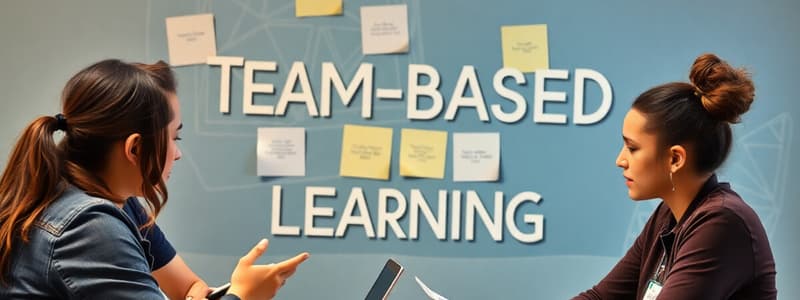Podcast
Questions and Answers
What is the primary focus of Team Based Learning (TBL)?
What is the primary focus of Team Based Learning (TBL)?
- Lecturing by the instructor
- Individual mastery of course content
- Memorization of textbook material
- Collaborative problem solving among teams (correct)
Which component is NOT part of the TBL process?
Which component is NOT part of the TBL process?
- Individual testing
- Pre-class preparation
- Peer lecturing (correct)
- Application-focused activities
What does the Readiness Assurance Process (RAP) primarily aim to achieve?
What does the Readiness Assurance Process (RAP) primarily aim to achieve?
- Focus on group presentations
- Facilitate individual study habits
- Ensure students are ready to engage with problem-solving (correct)
- Increase lecture time in class
In a typical TBL course, how many modules is it divided into?
In a typical TBL course, how many modules is it divided into?
Which of the following best describes the final activities of each TBL module?
Which of the following best describes the final activities of each TBL module?
The Individual Readiness Assurance Test (iRAT) is designed to evaluate what aspect of the student's preparation?
The Individual Readiness Assurance Test (iRAT) is designed to evaluate what aspect of the student's preparation?
Which step comes immediately after preparation in the TBL process?
Which step comes immediately after preparation in the TBL process?
What role do application activities play in the TBL model?
What role do application activities play in the TBL model?
What is the primary purpose of the Individual Readiness Assurance Test (iRAT)?
What is the primary purpose of the Individual Readiness Assurance Test (iRAT)?
Which aspect distinguishes the Team Readiness Assurance Test (tRAT) from the iRAT?
Which aspect distinguishes the Team Readiness Assurance Test (tRAT) from the iRAT?
What is a critical component of the appeals process in the Readiness Assurance Process?
What is a critical component of the appeals process in the Readiness Assurance Process?
How does the mini-lecture fit into the Readiness Assurance Process?
How does the mini-lecture fit into the Readiness Assurance Process?
What do students typically do during In Class Application Activities?
What do students typically do during In Class Application Activities?
Which statement best reflects the reported advantages of Team-Based Learning (TBL)?
Which statement best reflects the reported advantages of Team-Based Learning (TBL)?
What role do instructors play during the In Class Application Activities?
What role do instructors play during the In Class Application Activities?
Why is the use of a special scoring card in tRAT significant?
Why is the use of a special scoring card in tRAT significant?
Flashcards
Team-Based Learning (TBL)
Team-Based Learning (TBL)
An evidence-based learning strategy that combines individual and group work to improve knowledge and problem-solving skills.
iRAT
iRAT
Individual Readiness Assurance Test, a short quiz students take individually before a TBL session.
tRAT
tRAT
Team Readiness Assurance Test, a quiz taken by student teams to assess their grasp of the material.
TBL Module
TBL Module
Signup and view all the flashcards
Pre-Class Preparation
Pre-Class Preparation
Signup and view all the flashcards
Readiness Assurance Process (RAP)
Readiness Assurance Process (RAP)
Signup and view all the flashcards
Application Activities
Application Activities
Signup and view all the flashcards
Mini-Lecture
Mini-Lecture
Signup and view all the flashcards
Appeals Process
Appeals Process
Signup and view all the flashcards
Bloom's Levels
Bloom's Levels
Signup and view all the flashcards
Teamwork
Teamwork
Signup and view all the flashcards
Application Exercises
Application Exercises
Signup and view all the flashcards
Study Notes
Team Based Learning (TBL)
- TBL is an evidence-based learning and teaching strategy
- TBL uses an inductive instructional strategy to increase knowledge through individual testing and group collaboration
- Most classroom time in TBL is spent on student teams solving, reporting and discussing relevant problems
- Key components of TBL include: carefully formed and managed teams; frequent and timely feedback; problem-solving; and student peer evaluation
Definition of TBL
- TBL is an evidence-based learning and teaching strategy
- Students are engaged through individual testing and group collaboration which improves knowledge
- Class time is mainly used for student teams to solve, report and discuss solutions to significant problems
Steps of TBL
- TBL classes are structured around "modules" in a three-step cycle:
- Preparation before class: studying basic concepts
- In-class Readiness Assurance Testing (RAT): Individual (iRAT) and Team (tRAT) tests
- Application-focused activities: applying concepts and solving problems
- Typical TBL consists of 5-7 modules.
- Each module follows a similar rhythm: Readiness Assurance Process (RAP), followed by Application Activities that increase in complexity.
- Module duration can be one long session or may be spread across multiple sessions.
- Each module ends with a closure and reinforcement
How TBL Works: Readiness Assurance Process (RAP)
- RAP is a five-stage process used at the beginning of each module
- Each step ensures student progress from initial preparation to true readiness
- Steps include (in order from start to finish): Initial preparation, Preparatory materials-pre-readings, Individual Readiness Assurance Test (iRAT), Team Readiness Assurance Test (tRAT), Appeals Process, and finally Mini-Lecture/clarification, leading towards "True Readiness," to begin the modules problem-solving and preparation.
- Pre-Class Preparation: Students review preparatory materials (textbooks, articles, videos, PowerPoint slides); foundational vocabulary and concepts are highlighted to initiate problem-solving
- Individual Readiness Assurance Test (iRAT): A 10-20 multiple-choice question test that helps students acquire foundational knowledge
- Team Readiness Assurance Test (tRAT): Teams complete the same test; collaborative negotiation for team answers, and simultaneous team reporting occur through scoring tools (e.g., coloured cards)
- Appeals Process: Instructor promotes appeals for incorrect answers; Students investigate the correct answers and demonstrate their understanding, addressing any needed clarification
- Mini-lecture/clarification: Instructor focuses on remaining problematic concepts for students
In-Class Application Activities
- The bulk of classroom time is used after RAP, to apply concepts through application exercises
- Class sessions build upon prior knowledge
- Teams develop solutions through problem-solving exercises
- Teams work simultaneously to solve problems or tasks
- Instructors facilitate discussion, summarise, reinforce, and actively direct learning
Advantages of TBL
- Increased creative thinking and oral communication reported by students
- Active learning and teamwork are promoted and focused
- Flexible implementation for classes of various sizes
- Immediate feedback from facilitators is vital for student learning.
Studying That Suits You
Use AI to generate personalized quizzes and flashcards to suit your learning preferences.




